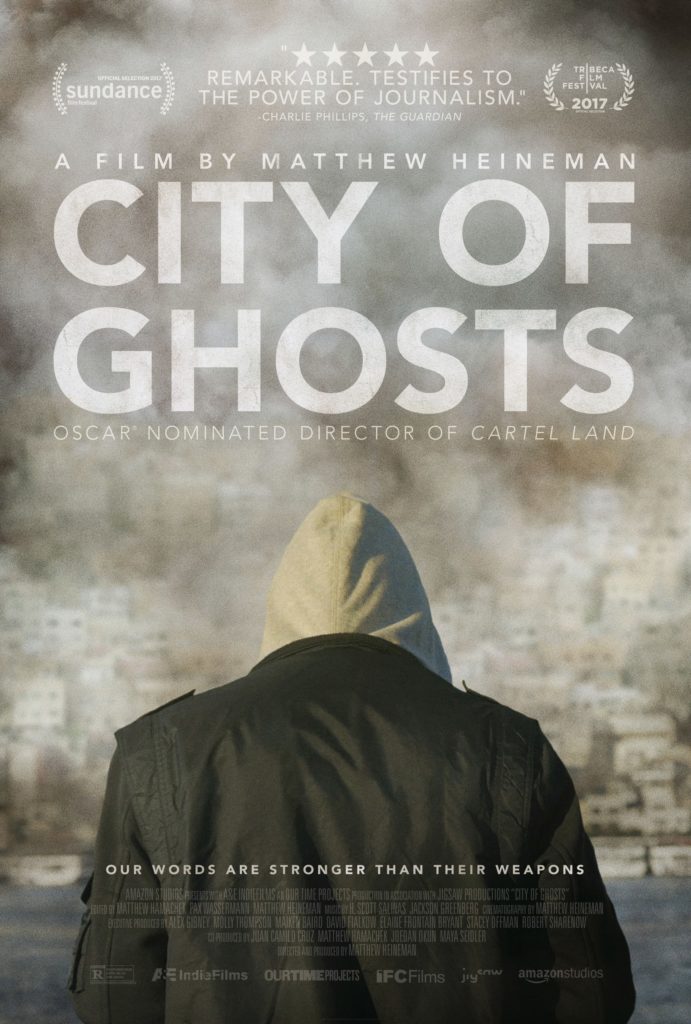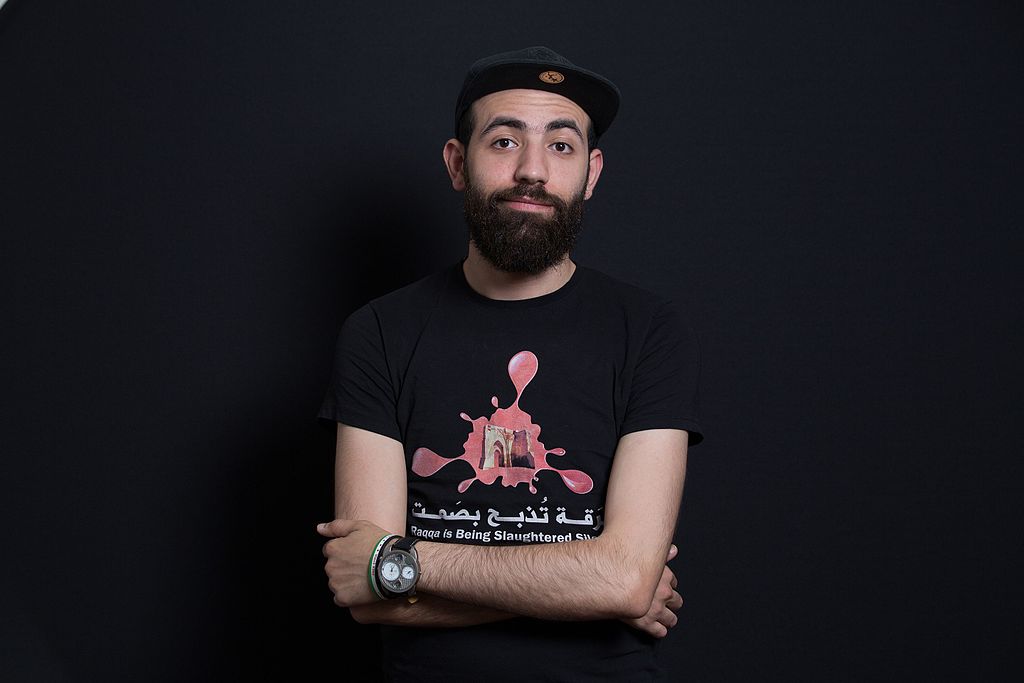“After Isis” email
In emails to our supporters, we often try to focus on an action that we want them to take. However – sometimes the most important thing you can do is just update them on what is happening. Your supporters are part of your organisation, and part of your job is to help them understand your issue. Your emails can often be read by more people than a news email and it’s more important as they know, trust and like you.
I have an optimism deep inside me more than six years since we first took to the streets. That is because today people are still demanding their rights.
Abdalaziz Alhamza
In 2017, the western-led coalition was in the midst of its scorched-earth bombing campaign against ISIS. The media focused daily on reports on Raqqa, the capital of the so-called Islamic State. However – it was still frustratingly rare to get a chance to hear what ordinary people in Raqqa were experiencing.
At this moment, a new film was due to come out called City of Ghosts, focusing on the incredible work of a group of activists called ‘Raqqa is being Silently Slaughtered (RBSS)’. We asked Abdalaziz Alhamza, one of the co-founders of RBSS, to write an email to supporters to explain the situation in Raqqa.

His email is far longer than most emails we normally send to supporters, and doesn’t ask them to take action. The goal was just to help people understand better the plight of people in Raqqa, and the hopes they still held for the future. We think it is one of the most powerful emails we have ever sent.
Dear Annie,
Raqqa, the city where I was born in 1991, used to be the forgotten city of Syria. The TV weather forecast even missed us out. Now as the capital of the Islamic State, the name of Raqqa is never far from the lips of world leaders.
To me, Raqqa is the city where I grew up and where I have my friends and relatives. It’s the city where I speak my accent (I miss it now) and where I went to school and spent my childhood. Raqqa is a place where everyone knows everyone else. If you don’t know someone directly, you’ll know his brother. And if you don’t know his brother, you’ll definitely know his cousin.
When I grew up everyone wanted to leave Syria for work – usually to somewhere like Dubai. But that’s because the government was controlling 80% of the economy. A country that has oil, gas, historical sites, antiquities, ancient civilisation, tourism and so much more besides. We were tired of the government controlling all the money. When I joined the peaceful protests in 2011 it was because I believe I have a right to have a good life in my own country.
For decades we were so scared. There was no freedom of expression, we used to say the walls have ears. Everyone was a spy and you’d keep hearing that this neighbour or that neighbour was arrested for political reasons. Saying a single word against the Assad regime could result in 20-50 years in prison or being killed. You can’t imagine these conditions.
But in 2011 we realised that people have more power than the government. People were able to break the fear and go into the street even though they knew they might face death in any second.
Most Syrians outside of my city never thought or talked about Raqqa until March 4, 2013, the morning we woke up to be the first liberated city in Syria. After nearly two years of protest and revolt, our people had managed to push the Assad regime forces out the city, and Syrians nicknamed Raqqa the “Capital of Liberation”.
That’s when for the first time in 40 years, civilians were running the city. We had a local and provincial council and dozens of civil society organisations. I was part of the Union of Free Syrian Students and we opened up the university again. Many people who were fleeing persecution from the Assad regime came to Raqqa and were able to have a normal life. Civil society organisations had more power than the armed groups – how it should be.
But then Isis came.
First, they came in small numbers, and we demonstrated against them. Then they came with heavy weapons stolen from Iraq and those who were defending Raqqa didn’t have the means to stop them. Our city’s fighters pleaded with the international community for more support but it didn’t come and Isis took over.
But Raqqawis – people from Raqqa – never accepted Isis.
Less than 1% of locals joined Isis. That means that most are against Isis but they can’t show it, they can’t say it, otherwise, they’ll be arrested or killed. Our people have been living under Isis for years but just keeping their heads low as civilians. This means no salaries and jobs. If they joined Isis they would get money, cars – even sex – but still, Raqqawis refuse. This silent refusal is one of the most important forms of resistance.
In April 2014 along with a few of my friends we set up Raqqa is Being Slaughtered Silently to counter Isis propaganda.
We began sneaking covert photos and footage out of Raqqa, publishing them on our social media channels, showing that this wasn’t the utopia that Isis claimed. We sprayed anti-Isis slogans on the walls of our town and published our own magazine mocking their propaganda. They hated it and hunted us down.
Many of us escaped Raqqa then but Isis responded by targeting our families. They released a propaganda video of the execution of the father of my friend and RBSS co-founder Hamoud al-Mousa. It’s one of the most brutal things I’ve ever had to watch. But this didn’t stop us. Our anonymous colleagues in Raqqa continue to this day to sneak out footage and information which gets picked up by the biggest networks in the world. Our pictures and video from inside the heart of Isis’s capital have been broadcast by the BBC, CNN and other channels.
But today the threat to my city’s civilians is not just from Isis.
The US and its allies have been begun bombing Raqqa and the surrounding area recklessly. Since the beginning of the year these airstrikes have killed more civilians than Isis. This ‘scorched earth’ policy is because they want to defeat Isis militarily as soon as possible. But they don’t ever think about the day after defeating Isis.
In the coming weeks and months as Isis gets driven out of its territory, people will ask who is taking over. The Kurdish-led forces backed by the West have displaced people and burned homes. It is hard to see them welcomed by locals in and around Raqqa.
And then there are rumours that these areas will be handed over to Assad. This is the worst scenario.
Many would be arrested and killed – it will be a massacre. Worse than that, it will be a step back to the beginning of this mess. Assad created this extremism. Many people were radicalised because of how his regime treated its own people. Every single Syrian has a brother, friend, neighbour or relative killed by Assad.
I have been interrogated many times by Isis, they killed many of my friends and they tried to kidnap me. And yet still I understand that Assad is the main problem in Syria. This is the issue that the world needs to understand.
And yet I am hopeful.
I have an optimism deep inside me more than six years since we first took to the streets. That is because today people are still demanding their rights. I feel hope looking at people in the different cities who are demonstrating every day. Like people in Maaret al-Numan who drove out Al Qaeda with their demonstrations.
That’s why I still have hope. There are still millions who believe in the Revolution. People who are resisting not only Assad, but all groups who are violating our rights. These are things that make me believe that one day we will have democracy and a united country where people can have jobs in a thriving economy.
When people outside the country ask what should be done about Raqqa or Syria, this is what I tell them. Help us to achieve a government that represents all of us, that will help us defeat extremism and permit Raqqawis and other Syrians to return home.
There is no other way.
Yours,
Aziz
Aziz (Abdalaziz Alhamza) is one of the co-founders of Raqqa is Being Slaughtered Silently. In 2015, the Committee to Protect Journalists awarded RBSS its prestigious International Press Freedom Award for their brave reporting.

An incredibly powerful film about RBSS by Oscar-nominated director Matthew Heineman has just been released in cinemas and online. ‘City of Ghosts’ was given 5 stars by The Guardian who said it “could be the definitive Syria documentary”. Please see here for dates of cinema screenings in the US and the UK. The film is available on demand for audiences in the UK and Ireland on iTunes and Curzon Home Cinema. City of Ghosts will also be available in the US and most countries on Amazon Prime from 13th October 2017.
If you would like to send Aziz and the team at RBSS a message of support, please reply to this email and we’ll make sure they get it.